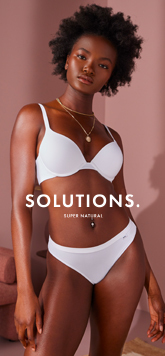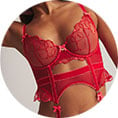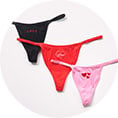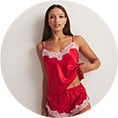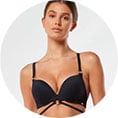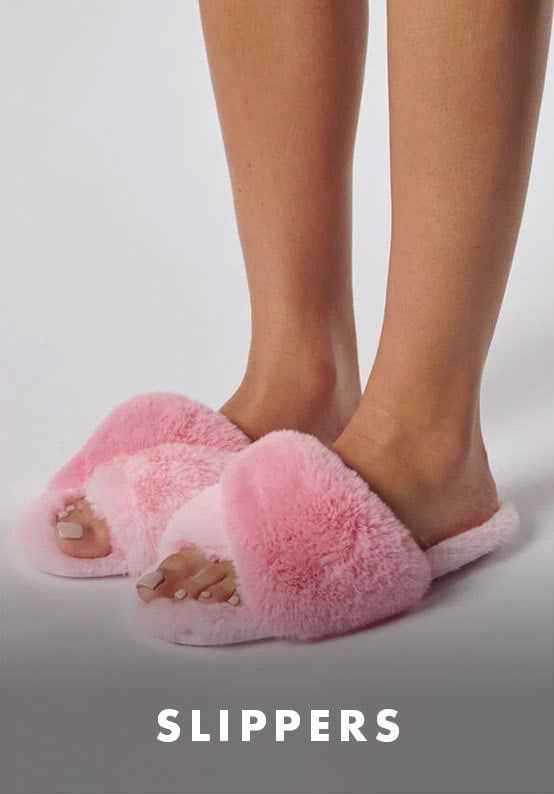
BREAST CANCER AWARENESS MONTH: INSPIRATIONAL STORIES
October is Breast Cancer Awareness Month, and here at Boux Avenue it is our mission to help look after women's health from top to bottom. That is why, this October, we are keen to support our community with the help of CoppaFeel!, the UK’s first and only youth focused breast cancer awareness charity, to help educate and raise awareness of breast cancer.
Hi I am Danni, 34 from Bristol. I have two children, Betsy 7 and Dexter 4, living with my partner Ant, and on July 1st 2021, I was diagnosed with stage 3 breast cancer.
We are strong advocates in reminding you to check your breasts, chest and pecks on a monthly basis as early detection can save lives. If you are unsure of the signs and symptoms, or looking for more advice be sure to check out our Let's Talk Boobs page.
Throughout October 2024, Boux Avenue is donating 10% of sales from the Ribbed Seamless Scallop Bralette and Ribbed Seamless Scallop Thong in Powder Pink. To help show why this is so important, Boux Avenue teamed up with four incredible women who have either lived with or are currently living with breast cancer. Be sure to read on to discover Vivian’s, Hannah’s, Danielle’s and Yasmin’s inspirational stories with breast cancer.
MEET VIVIAN NWOGU

Hi I am Vivian Nwogu, and a registered nurse. My cancer journey started, after finding a lump in my right breast, I went to the GP who referred me to the breast surgeon where I would later be diagnosed with Her2 Positive breast cancer. This came as a shock as I have no family history of any type of cancer, it was difficult for me to even share the story with my family. Visiting my doctor's office felt like a recipe for bad news because I always come out in tears and fear for the future.
Currently, I am on chemotherapy and through this journey my family, work colleagues and friends have been extremely supportive. My partner has been my biggest support and I can not tell this story without mentioning his impact in making sure that I am present at every hospital appointment and saving me a couple of times during medical emergencies.
I have been able to manage my mental health with the help of Macmillan Cancer support counselling and constant meditation to keep myself aligned to what I desire as an outcome of this journey, despite all that I have gone through and still dealing with. I will not let any of my struggles with cancer stop me from fighting and using my voice to encourage other women to fight this deadly disease no matter the situation they find themselves in.
My main piece of advice I could give you is to keep checking yourself, because early detection is the only way to win this battle against cancer.
MEET HANNAH GARDNER

Hi I am Hannah, 38 from West London. I was first diagnosed with breast cancer at 26 after accidentally coming across a lump in my left boob. Scans and tests later revealed it was an almost 10cm tumour that had gone unnoticed.
I had a double mastectomy, chemotherapy and hormone therapy. But despite all this the cancer returned a few years later. In fact, it kept returning. First, above my reconstructed left breast which required further surgery, chemo and radio...then under my arm (yep, more surgery but just radio and no chemo that time)...then in 2022, I received a final diagnosis. A stage four, incurable breast cancer diagnosis. The cancer had spread to my liver.
I've been on treatment since and will continue to be on treatment until the end. I have a beautiful little girl, 4, who I am determined to stick around for for as long as possible!
Please don’t forget to check your breast, chest and pecks on a regular basis, early detection is the key to beating breast cancer.
MEET DANIELLE MOORE

I started treatment in August 2021, and went on to have 13 rounds of chemotherapy, followed by a double mastectomy on the 9th February 2022 and made the decision to remain flat. After healing I had 15 rounds of radiotherapy and 18 rounds of immunotherapy injections.
On the 22nd April 2022, I finished all active treatment and have since been in remission; with the hope that it stays that way for a very long time.
Battling with daily pain and overcoming the mental torture of cancer is hard. However I hope that showing my scars and being open about my experience helps others facing a similar path.
Throughout my cancer journey I documented about it on The Boob Battle , and have continued to do so to show life during and after cancer as a young female. I am hopeful that the blog and my work will encourage people to check themselves and spread the message of body positivity, because it’s okay that we don’t all look the same.
MEET YASMIN REILLY

Hi I’m Yasmin and in April 2023 as I was showering whilst working abroad for work I felt a small hard lump at the front of my right breast, convinced it was maybe an ingrown hair I continued my day. A few weeks passed and the lump still remained, however I still didn’t believe it was anything serious, I mean it didn’t hurt and I felt absolutely fine so it was nothing to worry about right?
A few weeks turned into a few months, it was still there. I then decided to visit my GP as maybe it was a cyst. As the GP felt the lump she immediately said ‘ok, I’m going to have to refer you for an urgent 2 week appointment at the breast clinic’ I still wasn't convinced it was anything serious, I’m never ill.
Two days later I got a letter through my door with details of the appointment which stated ’suspected cancer’, my heart dropped seeing that word, but still, no way, I’m fine I thought.
After a biopsy and scans I had to wait for my results, I was nervous and scared constantly searching all over the internet to find someone like me going through this. I then got a phone call asking me to come in to get my results.
Heading towards the doctors room on the 4th August with my mum and sister all I was hoping for was to hear its early and they can just remove the lump. The doctor then informed me I had stage 1 non invasive breast cancer and would need further testing to see if it has spread.
I had a mammogram that same day but as I’m too young this didn’t show anything so I had to go for a MRI instead and a further biopsy. This showed it was larger than they initially thought and was actually now invasive cancer, my options for treatment were to either start chemo and then have a lumpectomy or mastectomy. I didn’t want chemo, I didn’t want to be ill, I didn’t want to loose my hair. I asked what about removing the whole breast, would that mean I could avoid chemo? The surgeon advises “Potentially yes, if you want to just get it all removed it is the safest option.” So I said yes, do it! It's just some tissue on my chest right?
13th September arrived and I went in for the surgery, waking up seeing a drain and bandages on my chest, it was done. I was discharged the next day and after 2 days had my drains removed. 5 days later it was time to remove my bandages, I couldn’t look at first, but when the nurse left I decided to look in the mirror. That isn’t me I thought with a tear in my eye, but then I gave my head a shake and said YES it is and it doesn’t change who you are!
A few weeks went by and on the 13th October I went in for my final results to see if they managed to remove it all and if adjuvant chemo would be needed. My results were clear and I didn’t need any chemo!
From that point the oncologist advised I would need hormone medication for 5 years as a preventative, and referred me to have my eggs frozen as it could cause complications in the future should I wish to have a child. The hormone medication has put my body into early menopause but I’m coping well with the side effects.
I was also tested for the BRCA gene as I had no history of cancer in the family but luckily that came back negative which meant I could safely keep my left breast. I am now on a waiting list for reconstruction and hope to have this done next year.
I currently use a prosthetic boob, which at first seemed strange but now it's normal. I stuff it in my bra and bikinis and no one can tell! I'm still me, I’m alive and that’s all that matters. I don’t feel any less of a woman, still feeling confident and happy.
Now I focus on raising awareness amongst younger women as I struggled to find someone I could relate to at the time, and feel it's important that I use my journey to offer support to any other women going through the same diagnosis.
SUPPORT COPPAFEEL WITH BOUX AVENUE
If you’re looking to support CoppaFeel, then throughout October 10% of sales from our Ribbed Seamless Scallop Bralette and Ribbed Seamless Scallop Thong in Powder Pink will be donated to CoppaFeel!. And while you’re lounging in this cosy set, be sure to check your breasts, chest and pecks for any of the signs and symptoms of Breast Cancer.
Happy boob checking gals and don’t forget to check out all the amazing charities doing great work for breast cancer support and research, like Breast Cancer Now and Cancer Research! If you have any tips on checking your boobs on the reg share them with us over on Insta so we can share with all the Boux gals!

